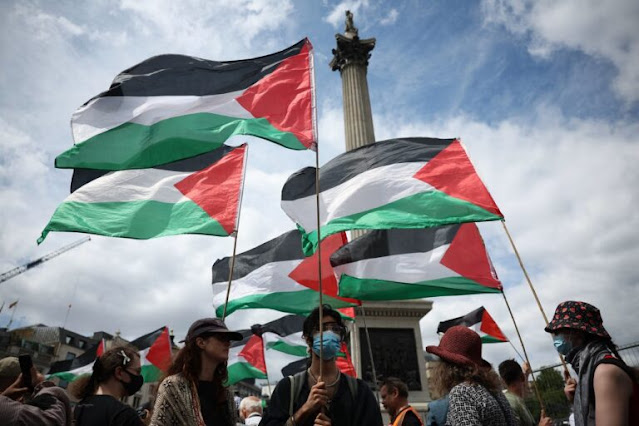On Tuesday, August 26, 2025, German Chancellor Friedrich Merz firmly declared Germany’s opposition to recognizing a Palestinian state, distancing his government from international partners such as Canada and France, which have recently signaled their intent to take steps toward such recognition. Speaking at a joint press conference in Berlin with Canadian Prime Minister Mark Carney, Merz emphasized that the conditions for Palestinian statehood are not currently met, underscoring Germany’s long-standing position that recognition should only occur as part of a negotiated two-state solution ensuring peaceful coexistence between Israel and Palestine. This announcement comes at a time of heightened global attention on the Israeli-Palestinian conflict, exacerbated by a worsening humanitarian crisis in Gaza, including a confirmed famine and deadly airstrikes on civilian infrastructure. This report provides a comprehensive examination of Germany’s stance, the contrasting approaches of its international partners, the broader geopolitical context, and the dire situation in Gaza, which continues to shape global debates on the path to peace.
Germany’s Position: A Commitment to a Negotiated Two-State Solution
During the press conference in Berlin, Chancellor Merz was unequivocal in rejecting calls for Germany to recognize a Palestinian state unilaterally. “We will not join this initiative,” he stated, addressing recent moves by countries like Canada and France. “We do not consider the conditions for state recognition to be fulfilled in any way at present.” Merz’s remarks reflect Germany’s consistent policy on the Israeli-Palestinian conflict, which prioritizes a negotiated settlement over unilateral actions. Germany has long maintained that recognizing a Palestinian state should be the outcome of direct talks between Israel and the Palestinian Authority, leading to a two-state solution where both nations can coexist peacefully with secure borders.
This position is rooted in Germany’s historical and political ties to Israel, which have shaped its foreign policy in the Middle East. As a key supporter of Israel’s right to exist and defend itself, Germany has often aligned its policies with the need to balance support for Israel with advocacy for Palestinian rights within the framework of a negotiated peace. Merz’s comments signal a continuation of this approach, even as other Western nations begin to shift toward recognizing Palestinian statehood in response to the deteriorating situation in Gaza and the stalled peace process.
The Chancellor’s stance is also influenced by domestic considerations. Germany’s political landscape is complex, with significant public and political support for Israel alongside growing concern about the humanitarian crisis in Gaza. Merz, a conservative leader from the Christian Democratic Union (CDU), faces pressure to maintain a cautious approach to avoid alienating key constituencies or straining relations with Israel, a vital ally. At the same time, Germany’s partial arms embargo on Israel, announced in response to planned military escalations in Gaza City, reflects an attempt to address international criticism of Israel’s actions while preserving diplomatic ties.
Contrasting Approaches: Canada, France, and the UK
In contrast to Germany’s position, Canadian Prime Minister Mark Carney announced during the same press conference that Canada would formally recognize a Palestinian state at the upcoming UN General Assembly in September 2025. Carney framed this decision as a critical step to “salvage the prospects of a two-state solution,” arguing that the prolonged stalemate in peace negotiations and the worsening humanitarian crisis in Gaza necessitate bold action. Canada’s move aligns with a growing trend among some Western nations to recognize Palestinian statehood as a means of pressuring Israel to return to the negotiating table and addressing the aspirations of the Palestinian people.
France, another key player in the international community, is reportedly preparing to follow a similar path. While details of France’s plans remain unclear, reports suggest that the French government is considering formal recognition of Palestine in the near future, potentially in coordination with other European nations. This shift reflects France’s frustration with the lack of progress in the peace process and its desire to play a more assertive role in Middle East diplomacy.
The United Kingdom, meanwhile, has taken a more cautious approach but has issued a warning to Israel that recognition of a Palestinian state could follow if certain conditions—such as halting settlement expansion or resuming meaningful peace talks—are not met. The UK’s position indicates a willingness to use the prospect of recognition as leverage, signaling a potential shift in its traditionally pro-Israel stance.
These divergent approaches among Western allies highlight the complexities of the Israeli-Palestinian conflict and the lack of a unified international strategy. While Germany remains steadfast in its commitment to a negotiated solution, countries like Canada and France are increasingly willing to take unilateral steps to address the Palestinian question, driven by both moral and strategic considerations. The growing divide among Western nations could have significant implications for the broader peace process, potentially isolating Germany and complicating efforts to achieve a coordinated international response.
The Humanitarian Crisis in Gaza: A Catalyst for Change
The backdrop to this diplomatic debate is the escalating humanitarian crisis in Gaza, which has reached catastrophic levels. On Monday, August 25, 2025, Israeli airstrikes targeted the Nasser Hospital in Khan Younis, killing at least 19 people, including five journalists. The United Nations recently confirmed that famine has broken out in parts of the enclave, with millions facing acute food insecurity. These developments have intensified global scrutiny of the conflict and underscored the urgent need for action to protect civilians and address the root causes of the crisis.
The airstrikes on Nasser Hospital, one of the few remaining functional medical facilities in Gaza, represent a significant escalation in the conflict. The attack killed healthcare workers and journalists, further depleting the region’s capacity to provide medical care and document the crisis. The hospital’s emergency department, inpatient ward, and surgical unit were severely damaged, rendering it nearly inoperable. The loss of journalists, who have played a critical role in reporting on the humanitarian situation, has drawn particular attention, with the UN and human rights organizations condemning the targeting of civilians and media personnel.
The confirmed famine in Gaza is a stark reminder of the human cost of the conflict. According to UN reports, more than 80% of Gaza’s 2.3 million residents are facing severe food shortages, with children and the elderly particularly vulnerable. The blockade imposed by Israel and Egypt since 2007, combined with ongoing hostilities, has restricted the flow of food, medicine, and other essential supplies, creating what UNRWA head Philippe Lazzarini has described as a “manmade famine.” The destruction of infrastructure, including water systems, power plants, and agricultural land, has exacerbated the crisis, leaving millions without access to clean water or electricity.
The humanitarian situation in Gaza has become a rallying cry for advocates of Palestinian statehood, who argue that recognition is a necessary step to address the systemic issues driving the crisis. Canada’s decision to recognize Palestine, for example, is framed as a response to the urgent need to restore hope for a two-state solution and alleviate the suffering of Gaza’s population. Similarly, France’s reported plans reflect a growing recognition that the status quo is unsustainable and that unilateral actions may be necessary to break the deadlock.
Germany’s Arms Embargo: A Balancing Act
Germany’s partial arms embargo on Israel, announced in response to planned military escalations in Gaza City, represents a significant shift in its policy toward the conflict. The decision reflects growing international concern about Israel’s military actions, particularly in light of the humanitarian crisis in Gaza. By restricting arms exports, Germany aims to signal its disapproval of Israel’s planned operations while maintaining its broader commitment to Israel’s security.
However, Chancellor Merz was quick to clarify that the arms embargo does not signal a change in Germany’s position on Palestinian statehood. “Our decision to limit arms exports is a response to specific actions, but it does not alter our fundamental stance on the need for a negotiated two-state solution,” he said during the press conference. This balancing act underscores the delicate position Germany occupies as a key ally of Israel and a major player in European diplomacy.
The arms embargo has sparked debate within Germany and beyond. Supporters argue that it sends a strong message to Israel about the need to prioritize civilian protection and pursue peace negotiations. Critics, however, contend that the move risks straining Germany’s relationship with Israel and could undermine its influence in the region. The decision also highlights the broader challenge of balancing humanitarian concerns with strategic interests, a dilemma faced by many Western nations navigating the Israeli-Palestinian conflict.
The Role of International Humanitarian Law
The airstrikes on Nasser Hospital and the broader humanitarian crisis in Gaza raise serious questions about compliance with international humanitarian law (IHL). The Geneva Conventions, which form the cornerstone of IHL, explicitly prohibit attacks on hospitals, medical personnel, and civilians during armed conflicts. The targeting of a major hospital like Nasser violates these principles, prompting calls for independent investigations into potential war crimes.
The deaths of five journalists in the airstrikes further underscore the risks faced by media personnel in conflict zones. Journalists are considered civilians under IHL and are entitled to the same protections as other non-combatants. The deliberate targeting of journalists, if proven, would constitute a serious violation of international law and undermine the principles of press freedom and the right to information.
Human rights organizations, including Amnesty International and Human Rights Watch, have called for accountability for attacks on civilian infrastructure and personnel in Gaza. However, the lack of effective mechanisms to enforce IHL remains a significant challenge. The UN Security Council, which has the authority to address violations of international law, has been paralyzed by divisions among its permanent members, with the United States often vetoing resolutions critical of Israel.
The Broader Geopolitical Context
The debate over Palestinian statehood and the crisis in Gaza must be understood within the broader geopolitical context of the Israeli-Palestinian conflict. The conflict, rooted in decades of territorial disputes, competing national aspirations, and failed peace negotiations, has reached a critical juncture. The current escalation, which began in October 2023, has been one of the deadliest phases of the conflict, with thousands of civilians killed and entire communities displaced.
Gaza, a densely populated enclave of 2.3 million people, has been under a blockade since 2007, following the takeover of the territory by Hamas. The blockade has severely restricted the movement of goods and people, leading to chronic shortages of food, medicine, and other essentials. The healthcare system, already strained by years of underinvestment and conflict, has been pushed to the breaking point by the recent surge in violence.
The international community’s response to the conflict has been marked by division and inaction. While some countries, like Canada and France, are moving toward recognizing Palestinian statehood, others, like Germany and the United States, remain committed to a negotiated solution. These divisions reflect differing priorities and strategic interests, with some nations prioritizing Israel’s security and others emphasizing the need to address Palestinian rights and the humanitarian crisis.
The UN General Assembly, where Canada plans to announce its recognition of Palestine, is likely to be a key battleground for these debates. The Assembly has historically been a platform for advocating Palestinian rights, with many member states supporting resolutions recognizing Palestine as a non-member observer state or condemning Israeli actions. However, the Assembly’s decisions are non-binding, and real progress will require action from the Security Council and key stakeholders in the conflict.
The Humanitarian Imperative: Addressing Gaza’s Crisis
The humanitarian crisis in Gaza demands urgent action from the international community. The confirmed famine, coupled with the destruction of healthcare infrastructure, has created a catastrophic situation for Gaza’s residents. The UN estimates that more than 1.9 million people—nearly 90% of the population—have been displaced since the onset of the current conflict. Many are living in overcrowded shelters, schools, or makeshift camps with limited access to food, water, or medical care.
The airstrikes on Nasser Hospital highlight the vulnerability of Gaza’s healthcare system, which is struggling to cope with the influx of injured patients and the loss of critical infrastructure. The deaths of healthcare workers and journalists further deplete the region’s capacity to respond to the crisis and document its impact. Humanitarian organizations, including the WHO and UNRWA, have called for unrestricted access to deliver aid, but logistical barriers and security risks continue to hamper their efforts.
Addressing the crisis requires a multi-pronged approach. In the immediate term, the international community must prioritize the delivery of food, water, and medical supplies to Gaza’s population. This will require lifting restrictions on aid convoys and ensuring safe passage for humanitarian workers. The protection of civilians, healthcare workers, and journalists must also be a priority, with measures to enforce IHL and hold perpetrators of violations accountable.
In the long term, addressing the root causes of the crisis is essential. This includes tackling the socio-economic challenges that fuel instability, such as poverty, unemployment, and lack of access to education. International donors and organizations must invest in rebuilding Gaza’s infrastructure, including its healthcare system, to create a foundation for recovery and resilience.
The Path to a Two-State Solution
The debate over Palestinian statehood is inextricably linked to the broader goal of achieving a two-state solution. The concept of two states—Israel and Palestine—coexisting peacefully with secure borders has been the cornerstone of international efforts to resolve the conflict. However, decades of failed negotiations, settlement expansion, and escalating violence have eroded confidence in the feasibility of this vision.
Germany’s insistence on a negotiated solution reflects a belief that unilateral recognition of Palestinian statehood could undermine the peace process by preempting direct talks. However, critics argue that the prolonged stalemate in negotiations, coupled with Israel’s continued settlement activity and military operations, has made a two-state solution increasingly difficult to achieve. Countries like Canada and France, by moving toward recognition, aim to shift the dynamics of the conflict and create new momentum for peace talks.
The path to a two-state solution will require compromise from all parties, as well as a renewed commitment to dialogue. International mediators, such as the United States, the European Union, and the UN, have a critical role to play in facilitating negotiations and addressing contentious issues such as borders, settlements, and the status of Jerusalem. The involvement of regional actors, including Egypt, Jordan, and the Gulf states, will also be essential to create a broader framework for peace.
Conclusion
Germany’s decision to reject recognition of a Palestinian state, as articulated by Chancellor Friedrich Merz, underscores the complexities of the Israeli-Palestinian conflict and the divergent approaches among Western allies. While Canada and France move toward recognition as a means of addressing the humanitarian crisis and advancing a two-state solution, Germany remains committed to a negotiated settlement, reflecting its historical ties to Israel and cautious approach to Middle East diplomacy.
The humanitarian crisis in Gaza, exemplified by the famine and the devastating airstrikes on Nasser Hospital, has brought renewed urgency to the debate over Palestinian statehood. The loss of 19 lives, including five journalists, and the destruction of critical healthcare infrastructure highlight the human cost of the conflict and the need for immediate action to protect civilians and deliver aid.
The international community faces a critical juncture in addressing the Israeli-Palestinian conflict. While Germany’s position reflects a commitment to diplomacy and negotiation, the growing momentum for unilateral recognition among other nations signals a potential shift in the global approach to the conflict. Bridging these divides will require bold leadership, sustained diplomatic efforts, and a commitment to addressing the humanitarian crisis in Gaza. Only through collective action can the international community hope to restore hope for a two-state solution and a lasting peace in the region.






